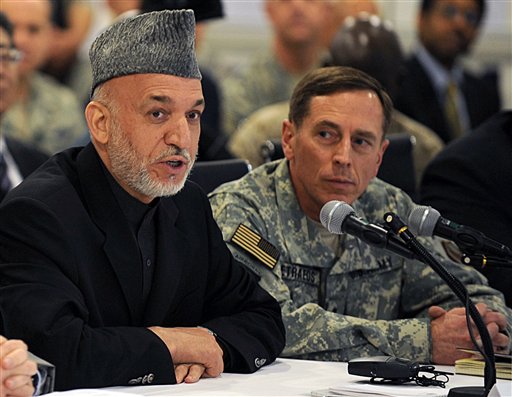 Rajiv Chandrasekaran writes for The Washington Post:
Rajiv Chandrasekaran writes for The Washington Post:
Afghan President Hamid Karzai had heard enough.
For more than an hour, Gen. David H. Petraeus, U.S. Ambassador Karl W. Eikenberry and other top Western officials in Kabul urged Karzai to delay implementing a ban on private security firms. Reconstruction projects worth billions of dollars would have to be shuttered, they maintained, if foreign guards were evicted.
Sitting at the head of a glass-topped, U-shaped table in his conference room, Karzai refused to budge, according to two people with direct knowledge of the late October meeting. He insisted that Afghan police and soldiers could protect the reconstruction workers, and he dismissed pleas for a delay.
As he spoke, he grew agitated, then enraged. He told them that he now has three "main enemies" --- the Taliban, the United States and the international community.
"If I had to choose sides today, I'd choose the Taliban," he fumed.
After a few more parting shots, he got up and walked out of the wood-paneled room.
The riposte, and the broader fight over private security contractors, prompted deep alarm among senior U.S. officials in Kabul and Washington. The Obama administration had been trying for the better part of a year to cast aside earlier disputes and make nice with Karzai. But it clearly was not working. Eikenberry told colleagues at the embassy that the relationship had hit its lowest point in years.
As President Obama and his national security team assess the war this week, a central element of the discussion will be their difficulties in building a partnership with Karzai. Despite a concerted effort by top diplomats and commanders, the United States has been unable to achieve more than ephemeral bonhomie with the Afghan leader.
"Our relationship with him has become so tortured," said a senior administration official. "We've gone from one crisis every three months to one crisis a month."
There is near-universal agreement among top U.S. officials involved in Afghanistan that Karzai's behavior and leadership have a direct bearing on the outcome of the multinational counterinsurgency mission. But they remain divided about how to improve their ties with him, and whether it is even possible.
Skeptics of the strategy contend his actions, particularly in the six months since the Obama administration started to embrace him as a partner, demonstrate that he cannot be rehabilitated. As a consequence, they maintain that the overall U.S. mission should be scaled back because it is impossible to conduct a counterinsurgency campaign without a steadfast ally in Kabul's presidential palace.
Supporters of the strategy are of two minds. Some argue that the United States should take a harder line with him. Others play down the blow-ups, casting them as normal disagreements among allies in a challenging situation. They express sympathy with his grievances, saying he is simply expressing frustration over years of U.S. mismanagement of the war and a failure to respond adequately to his concerns.
"Karzai is at fault for sparking a crisis, but we're at fault for letting it get there," said the senior official, who like others interviewed requested anonymity to speak frankly about the Afghan leader.
Karzai has been raising objections to private security firms for five years, and he repeatedly sought help from the U.S. government to limit the role of contract guards, "but nobody listened to him," said his chief of staff, Mohammad Umer Daudzai. "If our friends in the international community had helped us from the beginning, we wouldn't have to take such a drastic step."
The Afghan president's disputes with the United States appear to indicate a more fundamental difference over America's war strategy. Karzai insists the principal problem is the infiltration of insurgents from Pakistan. In his view, U.S. forces should be focused on the border, not on operations in Afghan villages, which he regards as too intrusive and disruptive.
"We will fight with you against terrorism. But terrorism is not invading Afghan homes," he said in a recent interview. U.S. troops, he said, should focus instead on "necessary activities along the border."
Americans maintain that the conflict is driven by tribal rivalries, an inequitable distribution of power at the local level and the government's failure to provide even the most basic services. That is why the U.S. solution is a comprehensive counterinsurgency strategy to improve security and governance.
In his flare-ups, Karzai "is sending us a message," said a senior U.S. military official. "And that message is, 'I don't believe in counterinsurgency.' "